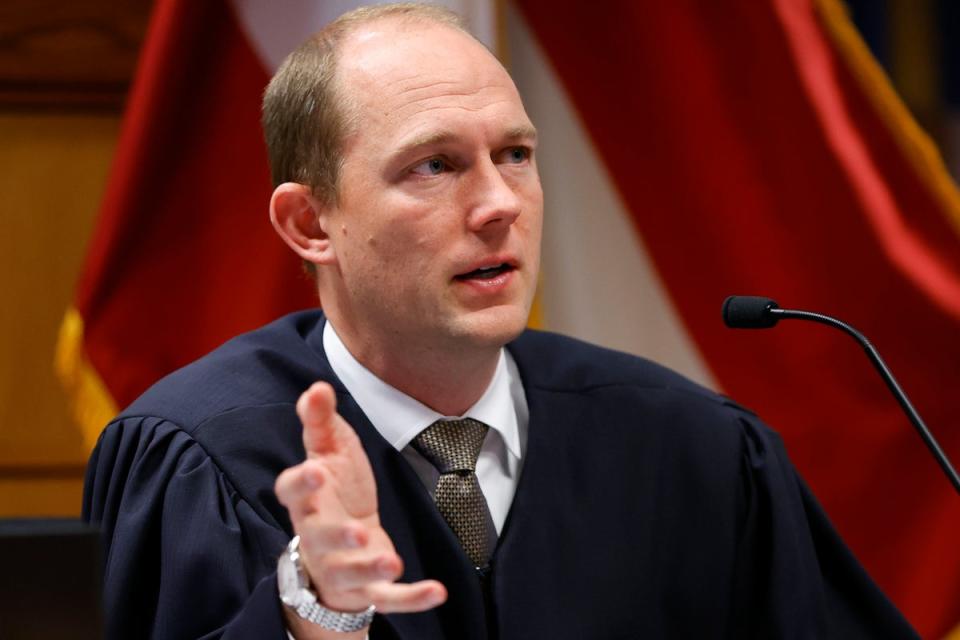Georgia judge drops six charges against Trump and co-defendants in election interference case
The judge overseeing Donald Trump’s election interference case in Georgia has dismissed several charges against the former president and five of his co-defendants but has stressed that his decision “does not mean the entire indictment is dismissed.”
Fulton County Superior Court Judge Scott McAfee did not throw out the racketeering charges facing all defendants in the sweeping election interference case and has refused to throw out certain “overt acts” in the indictment against them.
The judge dismissed three charges against Mr Trump stemming from an alleged pressure campaign to solicit state officials to violate their oaths of office and subvert Georgia’s election results to overturn his 2020 presidential election loss.
Judge McAfee dismissed six charges altogether against Mr Trump, his former attorney Rudy Giuliani, former White House chief of staff Mark Meadows, former attorney John Eastman, Georgia official Ray Stallings Smith III and attorney Bob Cheeley, who were implicated in an effort to pressure state lawmakers and Georgia’s secretary of state to falsely assert Mr Trump’s victory.
That pressure campaign included Mr Trump’s phone call to Georgia’s Republican Secretary of State Brad Raffensperger on 2 January, 2021, days before Congress convened to certify the nation’s election results, an event that was upended by a violent mob fuelled by Mr Trump’s bogus claims of victory.
“All I want to do is this. I just want to find 11,780 votes, which is one more than we have,” Mr Trump said during that call.
“The Court’s concern is less that the State has failed to allege sufficient conduct of the Defendants – in fact it has alleged an abundance,” Judge McAfee wrote on Wednesday. “However, the lack of detail concerning an essential legal element is, in the undersigned’s opinion, fatal.”
The judge argued that the charges “contain all the essential elements of the crimes but fail to allege sufficient detail regarding the nature of their commission, ie, the underlying felony solicited.”
The charges “do not give the defendants enough information to prepare their defenses intelligently, as the defendants could have violated the Constitutions and thus the statute in dozens, if not hundreds, of distinct ways,” according to Judge McAfee.
But, crucially, the judge noted that such deficiencies “do not apply” to six “overt acts” described in the indictment that support the RICO charge against all defendants, particularly acts that describe the pressure campaign from Mr Trump and his co-defendants against Georgia lawmakers and Mr Raffensperger.
“Overt acts alleged as part of a conspiracy are not held to the same pleading standards as statutorily based offenses,” the judge noted. “Defendants have not provided any authority requiring that the particulars of an overt act be alleged or subjecting overt acts to the standards of general or special demurrers. The defendants’ challenge of these overt acts is therefore denied.”
Fulton County district attorney Fani Willis “may also seek a reindictment supplementing these six counts,” the judge noted.
She may also appeal the judge’s decision.
In a footnote, the judge also dealt a major blow to defence arguments that state lawmakers’ weren’t doing their “official duties” when they met to come up with fake electors to falsely certify his victory.
“The Court disagrees and finds that the Georgia Senate can play a role in election contests and that the appointment of presidential electors relates to their official duties,” he wrote.
The judge’s dismissal of other charges, however, now leaves Mr Meadows with only a single charge, facing one count under the state’s RICO statute.

Mr Trump is charged alongside more than a dozen co-defendants who joined an alleged “criminal enterprise” to overturn election results, from using a so-called “fake elector” scheme to falsely assert his victory in a state he lost to Joe Biden, to pressuring election workers and state officials and seizing vote information from machines in another county in the state.
Four of Mr Trump’s original co-defendants in the Fulton County case – including attorneys Kenneth Chesebro, Jenna Ellis and Sidney Powell – pleaded guilty after reaching plea deals with prosecutors.
Judge McAfee is imminently expected to issue a decision on whether to disqualify Ms Willis from the case, following a high-stakes series of hearings on allegations that she financially benefited from a relationship with a prosecutor she hired to lead the case against the former president.
Lawyers for the former president and his co-defendants claim that Ms Willis improperly benefited from her romantic relationship with Nathan Wade when she hired him on the case and then had him pay for vacations they took together.
Ms Willis and Mr Wade have acknowledged the relationship, but they have repeatedly testified that they started dating after he was hired, split travel costs, and that the relationship ended last summer before an indictment.

 Yahoo News
Yahoo News 
